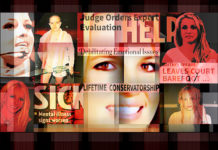Britney Speaks: Are We Ready to Listen?
Comparing her circumstances to sex trafficking, Britney Spears told the judge she wished to sue her conservators and be allowed to tell reporters “what they did to me.”
Reframing Britney: Press and Public Waking Up to Guardianship Harms
The documentary "Framing Britney Spears" has led to a change in the public’s view of Spears and even prompted political action on guardianship laws.
Diving into Your Soul: Lessons from “Queer Eye”
"Queer Eye" has a fresh, therapeutic twist: Installment after installment, it sends the repeated messages: Take care of yourself. Be kind to yourself. You’re beautiful. You’re good. We love you. Love yourself. Or, in the words of Van Ness: Yass, queen!
Reporting the COVID Crisis at Psychiatric Hospitals: A Missed Opportunity
In its coverage of the impact of COVID on psychiatric hospitals, the media missed opportunities to challenge stereotypes and interrogate problems with current carceral approaches to mental health treatment.
Inside a Pandemic: Media Struggle to Define What’s Normal
Press coverage of the effect of COVID-19 on mental health sends a confusing message: Becoming anxious about it is normal if you are mentally healthy but a sign of illness if you’re not. Although apparently some "normal" people might experience so much anxiety that they, too, could now be seen as mentally ill.
The Carter Center’s Guide for Mental Health Journalism: Don’t Question, Follow the Script
The Carter Center’s Journalism Resource Guide on Behavioral Health is a manual for docile journalism. There is no encouragement to be skeptical of the powerful in psychiatry. Rather, the guide provides reporters with a template to follow that reifies conventional wisdom, offering a message similar to what the American Psychiatric Association has sounded for years.
The Media’s New Hashtag: #GuardianshipIsGood for Britney Spears
Recent press coverage of top star Britney Spears, who remains under a personal and professional guardianship, reflects conventional attitudes about “mental illness” that are both stigmatizing and encourage legislation that promotes forced treatment.
The Media Scolds Marianne Williamson (And Gets It Wrong)
Journalists have called Marianne Williams’ comments on depression dangerous and irresponsible. A closer look reveals that her “opinions” on mental health treatment are more in line with the science, and that the know-it-all assertions by Cooper and colleagues are belied by it.
The New Yorker Peers into the Psychiatric Abyss… And Loses Its Nerve
The New Yorker's story on Laura Delano and psychiatric drug withdrawal is a glass-half-full story: It addresses a problem in psychiatry and yet hides the deeper story to be told. A story of how her recovery resulted from seeing herself within a counter-narrative that tells of the harm that psychiatry can do.
Adolescent Suicide and The Black Box Warning: STAT Gets It All Wrong
STAT recently published an opinion piece arguing that the black box warning on antidepressants has led to an increase in adolescent suicide.
It is easily debunked, and reveals once again how our society is regularly misled about research findings related to psychiatric drugs. STAT has lent its good name to a false story that, unfortunately, will resonate loudly with the public.


















